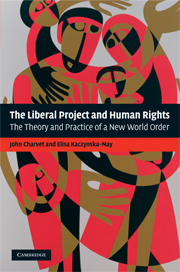Book contents
- Frontmatter
- Contents
- List of abbreviations
- Preface
- Introduction: what is liberalism?
- Part I Liberal beginnings
- Part II The UN regime on human rights
- 4 The UN and regional declarations and covenants on human rights
- 5 The right of peoples to self-determination
- 6 The right to development and development assistance
- 7 Women's international human rights
- 8 The implementation of international human rights
- Part III Critique and defence of liberalism
- Notes
- Index
7 - Women's international human rights
Published online by Cambridge University Press: 04 June 2010
- Frontmatter
- Contents
- List of abbreviations
- Preface
- Introduction: what is liberalism?
- Part I Liberal beginnings
- Part II The UN regime on human rights
- 4 The UN and regional declarations and covenants on human rights
- 5 The right of peoples to self-determination
- 6 The right to development and development assistance
- 7 Women's international human rights
- 8 The implementation of international human rights
- Part III Critique and defence of liberalism
- Notes
- Index
Summary
Women are guaranteed equal rights with men in all respects under the Charter of the UN, which says that the peoples of the UN reaffirm faith in the equal rights of men and women, and Article 1(3) commits the UN to promote respect for human rights for all without distinction as to race, sex, language or religion. The Universal Declaration of Human Rights contains a similar affirmation (Art. 2), as do the ICCPR (Art. 2.1) and the ICESCR (Art. 2.2).
However, Article 16(3) of the Universal Declaration of Human Rights (UDHR) states that the family is the natural and fundamental group unit of society and is entitled to protection by society and the state. Some feminists believe that as nothing is said about the effect of family structure on the enjoyment by women of equal rights, this provision gives states carte blanche to give priority to the patriarchal family preservation over women's rights. At any rate, it shows the lack of seriousness about women's rights in the early documents.
Indeed, it is now widely held that the protection these instruments offered women against discrimination on grounds of sex was of little effect and that women's rights and women's issues were almost entirely neglected by the UN for many years.
Such criticisms could no longer be made after the coming into force of the Convention on the Elimination of All Forms of Discrimination Against Women: a convention that requires states not only to prohibit discrimination but also to take affirmative steps in order to achieve gender equality.
- Type
- Chapter
- Information
- The Liberal Project and Human RightsThe Theory and Practice of a New World Order, pp. 200 - 222Publisher: Cambridge University PressPrint publication year: 2008



